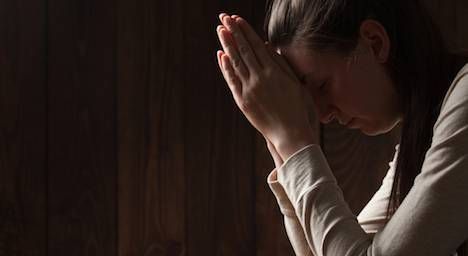
Reading is My Religion
This is a guest post from Kristy Pasquariello. Kristy loves Little Women and Doctor Who with equal fervor. A children’s librarian and former (recovering) archivist, Kristy lives in a tiny town outside of Boston, Massachusetts, with two kids, two cats, one husband and a gazillion books. When she’s not singing the Itsy Bitsy Spider to a group of babies (#bestjobever), Kristy writes reviews for children’s books at the Horn Book Guide and School Library Journal. For a list of book prescriptions, check out her blog at librarydose.wordpress.com.
I was 14 years old when I first started to doubt the Catholic faith I had been raised with. I had been baptized, confirmed, and attended church regularly with my family. But it wasn’t until I turned the corner from adolescence to early adulthood that I actually started to listen to the words that were said in church and found that they held no significance for me. So I did what I had always done and consulted books for answers. I thumbed through the onion skin pages of the Bibles placed in every pew in search of some words I could relate to and found nothing. I read Thomas Merton and C.S. Lewis and even a bit of Anne Lamott. And while I admired these writers and their style, I still could not relate. I read about their journey to faith from a place of mild interest, like I was learning about someone’s ability to do complicated math or elaborate dance moves: how great for them, but what does it have to do with me and my life?
I wanted my faith to come easily, like seemed to for everyone else. But something just didn’t click with me, and I started to doubt the veracity of everything that I assumed I knew about the world. What followed was a year’s worth of questioning all that had once seemed safe and impenetrable. I had panic attacks and fits of crying. I felt vulnerable and confused and suddenly very scared of death. What is there, if there is no God? What’s the point of caring about anything? I came to understand what writers and artists referred to when they talked about “staring into the void.”
Enter Jack Kerouac’s novel On the Road. I stumbled on this book while browsing a smoke shop/bookstore/magazine stand in downtown Fort Lauderdale, FL where I grew up. Reeking of clove cigarettes and cheap incense, this hole in the wall store contained an inexplicably impressive array of alternative novels, poetry, essay collections, zines and, yes, pornography. For whatever reason, the guy behind the desk never bothered me as I loitered in the aisles with the small black and white paperback of Allen Ginsberg’s Howl and Jim Carroll’s memoir The Basketball Diaries. It was here that I picked up my first copy of On the Road. The cool cover photographs of Kerouac and his friends smoking cigarettes and staring off into the skyline drew me in immediately.
I took it home and devoured it in one week’s time. It was as if this book had taken me by the shoulders and shaken the light back into my eyes. I felt energized, enthralled and vaguely annoyed with myself for having wasted so much time moping and feeling sad. Sal Paradise and his friends were propelled by experiencing the best life they could with the things they had. No money? No problem. Do everything you can to fund your next adventure and drink in every detail around you–the beautiful, the terrible, the wondrous and the sad. Every second of every day is worth noticing. Of course, as I later came to understand, the characters in On the Road are also largely motivated by sex and drugs, but this (admittedly large) detail of the story went right over my innocent teenage head.
Despite my lack of knowledge and experience, I was able to make a profound connection with On the Road that shook me out of my angsty teenage stupor and made me excited to live again. Although I had always been a book lover, it wasn’t until I read Jack Kerouac at such a pivotal time in my life that I was able to fully grasp the significance, impact and direction a story could have on my personal life.
As I’ve gotten older, I’ve still been unable to connect to religion or to a solid belief in any kind of god. My lack of faith has been perplexing and anxiety inducing at times as I have tried (and read) so hard to understand what makes people believe in a god. My one constant, however, has been my unshakable faith in books and reading. There is something for everyone in a book — no matter who you are or where you have come from, you can find some kind of representation between the pages.
I don’t miss religion in my life like I used to. For me, the ability to understand people’s motivations and emotions, to be able to see the world through someone’s else’s eyes, has been my religion and my reward, and I finally feel that it’s enough for me.













